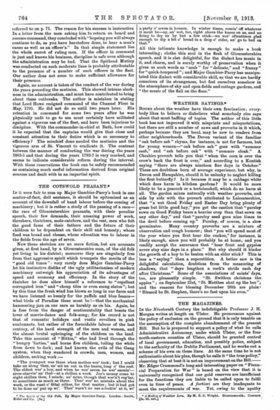THE COTSWOLD PEASANT.*
IF it were fair to sum up Major Gambier-Parry's book in one matter-of-fact, dull sentence, it should be epitomized as an account of the downfall of hand labour before the coming of machinery ; but it is rather a study of the passing of a race— the race of Gloucestershire peasants, with their peculiar speech, their few demands, their amazing power of work, threshers, thatchers, mole-catchers, and the rest, men who felt the good fame of their fathers and the future of their children to be dependent on their skill and honesty; whose
food was bread and cheese, whose education was to labour in the fields from the age of seven. Now these sketches are no mere fiction, but are accounts given, at first band, by a Gloucestershire man, of the old folk yet living in his district; moreover they are singularly free from that aggressive spirit which trumpets the merits of the "good old times " : very rarely does Major Gambier-Parry let his instinctive dislike of the ugly utilitarianism of modern machinery outweigh his appreciation of its advantages of speed and economy and efficiency. In the story of the thatcher he does allow himself a reference to "repellent corrugated iron" and "cheap tiles or even smug slates "; but by this time the fresh wind has blown so long in our faces and we have listened so keenly for the yaffels and blue Isaacs— what birds of Paradise these must be !—tbat the mechanical hammering jars on our ears as harshly as on his. Again, he is free from the danger of sentimentality that besets the lover of morris-dance and folk-song; for his record is not that of romantic holidays and rustic revellers in pink sunbonnets, but rather of the formidable labour of the last century, of the hard strength of the men and women, and
the almost brutal upbringing of the children on the land. Take this account of " Bithie," who had lived through the "hungry 'forties," and borne five children, toiling the while from dawn to dark ; and had known the evils of the Gang system, when they wandered in crowds, men, women, and children, seeking work :— "The youngest was three when mother wee took; but I could take un along then, an' set un out in the burru, long o' the rest. The eldest wer' a boy, and when he wer' seven he wer' earnin'— crow-starvin' an' that—at a shillun a week. Joe's money come to eight shillun then, I minds; an' mine, though that wer'n't reglar, to sometimes as much as three. Ther' wer' no mistake about the work, or the want o' fittal either, for that matter ; but it had got to be done an' put up wi'. Ther' warn't no use a-lookin' at it, wi'
a party o' seven in bousen. In winter times, comin' off whatever it meut be—ay, an' wet, too, right above the knees on us, and no firing to dry us by but a few stick—we wer' oftentimes glad enough to dip a bit o' bread in a drop o' cider, an' go to bed on that."
All this intimate knowledge is enough to make a book interesting ; clothe this soul in the flesh of Gloucestershire speech, and it is also delightful, for the dialect has music in it, and charm, and is surely worthy of preservation when it gives us such words as "nesh " for "delicate," and " franzy " for " quick-tempered " ; and Major Gambier-Parry has manipulated this dialect with considerable skill, so that we are hardly conscious of its strangeness, but feel ourselves somehow in the atmosphere of sky and open fields and cottage gardens, and "the music of the flail on the floor."


















































 Previous page
Previous page